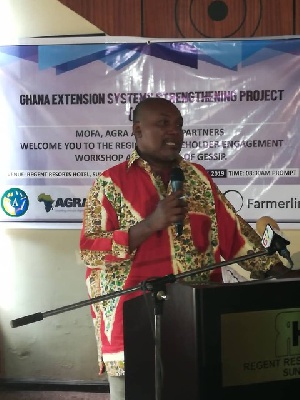 Robert Patrick Ankobiah, Chief Director of the Ministry of Food and Agriculture
Robert Patrick Ankobiah, Chief Director of the Ministry of Food and Agriculture
For women farmers in Wulensi agriculture is paying off. Their lives have improved because of the introduction of extension service delivery.
“They get information on new technologies which has improved their productivity. It has helped them because most of them have been able to educate their children. Some women are the bread winners and they are able to do it through the extension service that we give them,” said Vida Alhassan Adamu, District Agric Officer for Women in Agric Development.
Studies have corroborated the success stories of the women in Wulensi. It’s been proven that extension services in agriculture can equip smallholder farmers to deal with agricultural challenges eventually increasing productivity.
If improved technologies in seeds and agrochemicals will yield the expected results there must be a strong extension service delivery.
But Ghana still has stark challenges when it comes to effective extension service support to smallholder farmers.
“We need to do something right” says Theophilus Osei Owusu, Acting Director for Directorate of Agricultural Extension Services, if small scale farmers who produce 90% of Ghana’s agricultural needs can improve on their yields.
It is on this backdrop that the Ghana Extension Systems Strengthening Project GESSiP has been launched in the Northern and Brong Ahafo regions of Ghana.
The project seeks to execute efficiently on extension service delivery which is one of the key pillars the government of Ghana’s flagship program Planting for Food and Jobs hinges on.
“GESSiP which is being launched in the region today falls in line with government’s dream of strengthening extension services delivery in the country.” said Brong Ahafo Regional Minister Evans Opoku-Bobbie. “It has really come at the right time to complement government’s effort in revamping the agricultural sector.”
GESSiP takes the consortium approach with member from the Catholic Relief Services, Directorate of Agricultural Extension Services of the Ministry of Food and Agriculture, The Hunger project and Farmerline.
With funding from the Alliance for a Green Revolution in Africa AGRA, the consortium’s mandate is clear, to target 672,000 small holder farmers in both regions with agricultural knowledge on new technologies to improve productivity in the rice, cassava, soya beans and maize value chains.
In addition to this 2,240 village based advisors will be trained and certified to deliver extension support services in the communities. The thirty six (36) month project will be rolled out in a total of 28 districts – 14 districts in each of the regions.
The choice of the Northern and Brong Ahafo regions is strategic. In the Northern region, “there is a low extension worker to farmer ratio of one worker to 2,300 farmers, far lower than the national average of one to 1,500,” according to Carolyn Edlebeck , Head of programmes Catholic Relief Services.
The two regions also produce the largest quantity of the staple corps under the project. Research also indicates that 40% and 11% of people in rural communities in the Northern and Brong Ahafo regions respectively are at risk of food insecurity.
The consortium according to Program Officer at AGRA Ghana, Regina Richardson” is going to partner with private sector strongly” to ensure sustainability. According to her, GESSiP’s unique model provides the opportunity whereby farmers learn by doing. This is a move away from traditional models where farmers only learn by hearing and seeing. Beneficiary farmers will receive small input packs to conduct their own farmer-led demos under the supervision of the extension advisors.
Addressing participants from MoFA district directors, seed companies, extension officers, farmers and agro-imput dealers, Chief Director of the Ministry of Food and Agriculture Robert Patrick Ankobiah urged “all departments of agriculture, farmers, private sector actors {among others} to do everything possible to support the successful implementation of GESSiP…This will enable us attain the district level industrialization drive and provide the much needed jobs for the teeming unemployed youth.”
“Our goals are very big,” said Dr Rufaro Madakadze, Senior Program Officer at AGRA in charge of Extension and Capacity Building. “We want to double the yields, we want to increase the incomes of smallholder farmers.”